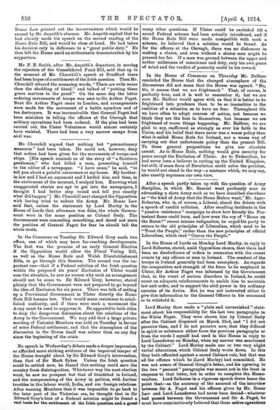Lord Morley Then Made A " Plain And Unvarnished "
state- ment about his responsibility for the last two paragraphs in the White Paper. They were shown him by Colonel Seely after the Cabinet dispersed on March 23rd, and "I did......
Mr. F. E. Smith, After Mr. Asquith's Departure, In Moving
the rejection of the Consolidated Fund Bill, said that up to the moment of Mr. Churchill's speech at Bradford there had been hopes of a settlement of the Irish question. Then......
Mr. Churchill Argued That Nothing But "precautionary...
taken. He could not, however, deny that orders had been given for the movements of troops and ships. [His speech reminds us of the story of " a Southern gentleman," who had......
No Speech In Wednesday's Debate Made A Deeper Impression, Or
afforded more striking evidence of the improved temper of the House brought about by Sir Edward Grey's intervention, than that of Sir Mark Sykes. Unless the Irish question could......
In The House Of Commons On Thursday Mr. Balfour Reminded
the House that the changed atmosphere of the discussions did not mean that the House was agreed. "No, Sir, it means that we are frightened." That, of course, is perfectly true,......
In The House Of Lords On Monday Lord Morley, In
reply to Lord Selborne, stated, amid Opposition cheers, that there had been no disobedience of orders in connexion with the recent events by any officers or men in Ireland. The......
In The Commons On Tuesday Sir Edward Grey Made Two
offers, one of which may have far-reaching developments. The first was the promise of an early General Election if the Opposition would allow the Plural Voting Bill, as well as......
After A Speech Partly Taken Up With The Question Of
Army discipline, in which Mr. Samuel went perilously near to advocating a slave Army such as we have described elsewhere as " the kind of Army that the Home Rulers want," Mr.......
On Monday In The Commons Mr. Asquith Made The Moat
dramatic announcements of the whole crisis. Ho stated (1) that Colonel Seely bad resigned his position as Secretary for War and had retired from the Cabinet; (2) that he (Mr.......














































 Previous page
Previous page